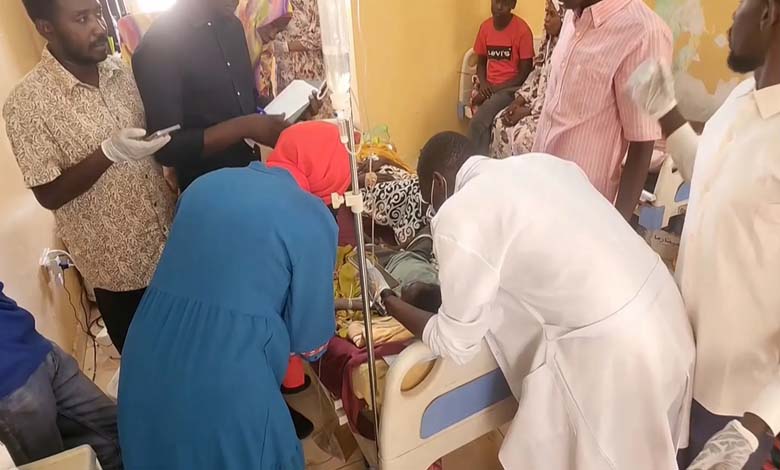Sudan Faces Total Health Collapse as Epidemics Spread and 160 Hospitals Shut Down

Sudan is experiencing one of the most severe health crises in its modern history, with the near-total collapse of the medical sector in major states such as Khartoum, Al-Jazira, and the Northern region. As cholera, dengue, and malaria spread at an alarming pace, millions of Sudanese are caught between poverty, the desperate search for medicines, and the struggle to find a functioning hospital, while military leaders appear preoccupied with travel and luxury, detached from the catastrophic reality.
-
Sudan Has Lost 70% of Its Hospitals: The Health Sector is Collapsing Under the Weight of War
-
As fighting escalates… The collapse of the healthcare system in Sudan and the closure of hospitals
Deadly epidemics: Cholera and dengue at the forefront
According to epidemiological reports, more than 100,000 cholera cases have been recorded since August 2024, with around 2,500 deaths, most notably in Khartoum (22,225 cases), North Kordofan, and White Nile states. North, South, and East Darfur have also reported hundreds of infections and dozens of deaths.
Dengue fever has also spread rapidly, with a cumulative total of 13,331 cases and 22 deaths since July 2024, concentrated mainly in Khartoum, White Nile, and Blue Nile states. In Karari alone, over 7,200 cases have been reported, underscoring the severity of transmission in densely populated areas.
-
Humanitarian crisis worsening… Half of Sudanese hospitals in Khartoum have stopped working
-
Sudan Between Epidemics and Collapse: An Incapable State and a People Facing Death
A collapsing healthcare system and 160 hospitals out of service
The crisis has worsened with the collapse of the health system and the shutdown of more than 160 public and private hospitals, leaving thousands of patients without treatment. Essential medicines such as paracetamol and antibiotics have disappeared from the market, while persistent power outages have crippled critical medical equipment, including ventilators and neonatal incubators.
Humanitarian dimensions: daily suffering
The disaster goes beyond statistics, manifesting in painful daily realities. Families carry their sick on their shoulders or in donkey carts to reach the nearest health center. Others face slow death due to the inability to afford medicines or transportation costs. With the economic collapse, the population’s immunity has drastically weakened, leaving them even more vulnerable to epidemics.
-
The Army in Luxury, the People in Slow Death: Sudan on the Brink of Total Collapse
-
Health and Politics in Sudan: The Collapse of the Social Contract in an Era of Disease
Luxury of the elites vs. suffering of the people
The crisis starkly contrasts with the lifestyle of military leaders, accused of traveling abroad and staying in luxury hotels while women and children die from cholera and malaria. This attitude reveals a glaring lack of national responsibility at a time when Sudan desperately needs exceptional leadership to manage the emergency.
An urgent call for international intervention
With the simultaneous collapse of health and economic systems and the unprecedented spread of epidemics, the call for urgent international intervention has become critical. The United Nations, the World Health Organization, and humanitarian organizations are urged to scale up logistical and medical support, ensure the delivery of essential medicines and supplies to affected areas, and prevent millions of lives from being lost to a grim fate.
-
Soaring prices and epidemics: Al-Burhan’s corruption traps Sudan
-
Political Analyst: Children Are the Greatest Victims of War and the International Community Selectively Ignores the Sudanese Tragedy
Official statistics updated – September 2025
- Cholera: more than 100,000 cumulative cases since August 2024 – 2,500 deaths.
- Dengue: 13,331 cumulative cases since July 2024 – 22 deaths.
- Hospitals out of service: more than 160.












